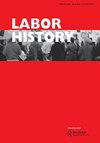Understanding the support from the Australian far-left and ALP-Left for Greek Cypriot enosis during the EOKA period (1955-59): migrant workers, anti-imperialism and national liberation in Australia
IF 0.7
4区 管理学
Q1 HISTORY
引用次数: 0
Abstract
ABSTRACT Why did the Australian far-left, namely the Communist Party of Australia (CPA), and the left-wing of the Australian Labor Party (ALP-left), support Cypriot enosis (union with Greece), when it was led by a violent far-right nationalist group, EOKA, and Greece was a repressive right-wing state? There are two aspects to answering this question: the ideological-intellectual and the political-electoral. Intellectually, the CPA and the ALP-left favoured their anti-imperialism and support for left-wing national liberation over any qualms in supporting far-right nationalist causes. Politically, they saw an electoral opportunity in courting left-wing and potential left-wing Greek-speaking migrants from Greece and Cyprus and championing both their labour and perceived ‘national’ causes. In doing so, they engaged with the Greek-speaking migrant labouring classes and gave prominence to their perceived ‘national’ struggles. This article considers why and how the Australian far-left in the form of the CPA and ALP-left became involved in the enosis politics of Greek Cypriots and the violent struggle of a small far-right minority in the island, while attempting to court the votes of left-wing Greek-speaking migrants, by supporting them in what they accepted was their ‘national’ cause – the ‘liberation’ of Cyprus and its enosis with Greece.了解EOKA时期(1955-59)澳大利亚极左翼和工党左翼对希族塞人独立的支持:澳大利亚的移民工人、反帝国主义和民族解放
摘要为什么澳大利亚极左翼,即澳大利亚共产党(CPA)和澳大利亚工党左翼(ALP left),在极右翼暴力民族主义团体EOKA的领导下,支持塞浦路斯与希腊的联盟,而希腊是一个镇压性的右翼国家?回答这个问题有两个方面:思想知识分子和政治选举。在理智上,CPA和ALP左派倾向于他们的反帝国主义和对左翼民族解放的支持,而不是对支持极右翼民族主义事业的任何疑虑。在政治上,他们看到了一个选举机会,吸引了来自希腊和塞浦路斯的左翼和潜在的讲希腊语的左翼移民,并支持他们的劳工和所谓的“国家”事业。在这样做的过程中,他们与讲希腊语的移民劳工阶层接触,并突出了他们所感知的“民族”斗争。本文探讨了澳大利亚极左翼以CPA和ALP左派的形式参与希族塞人的enosis政治和岛上少数极右翼的暴力斗争的原因和方式,同时试图争取讲希腊语的左翼移民的选票,通过支持他们接受的“民族”事业——塞浦路斯的“解放”及其与希腊的关系。
本文章由计算机程序翻译,如有差异,请以英文原文为准。
求助全文
约1分钟内获得全文
求助全文
来源期刊

Labor History
Multiple-
CiteScore
1.00
自引率
28.60%
发文量
44
期刊介绍:
Labor History is the pre-eminent journal for historical scholarship on labor. It is thoroughly ecumenical in its approach and showcases the work of labor historians, industrial relations scholars, labor economists, political scientists, sociologists, social movement theorists, business scholars and all others who write about labor issues. Labor History is also committed to geographical and chronological breadth. It publishes work on labor in the US and all other areas of the world. It is concerned with questions of labor in every time period, from the eighteenth century to contemporary events. Labor History provides a forum for all labor scholars, thus helping to bind together a large but fragmented area of study. By embracing all disciplines, time frames and locales, Labor History is the flagship journal of the entire field. All research articles published in the journal have undergone rigorous peer review, based on initial editor screening and refereeing by at least two anonymous referees.
 求助内容:
求助内容: 应助结果提醒方式:
应助结果提醒方式:


